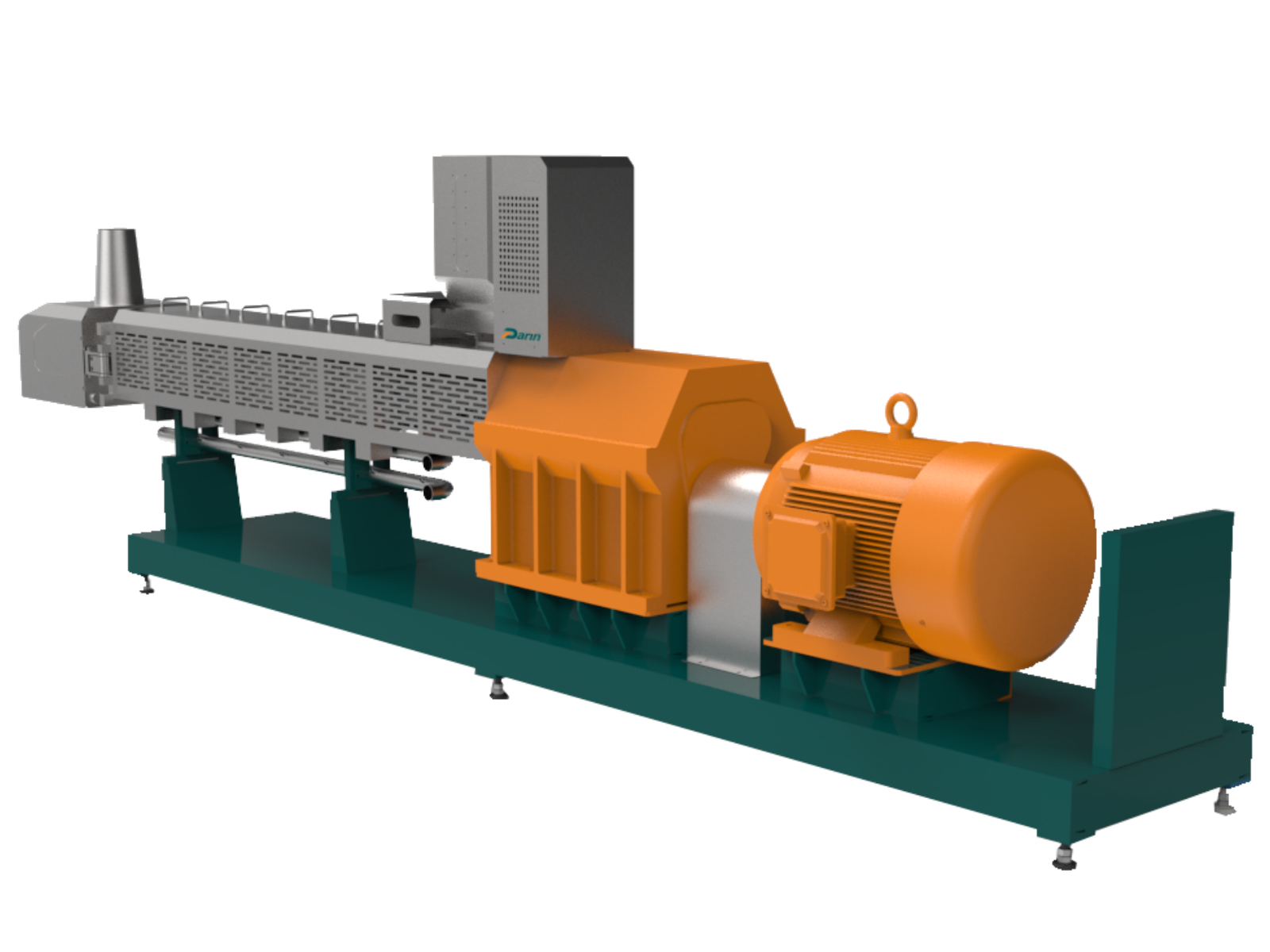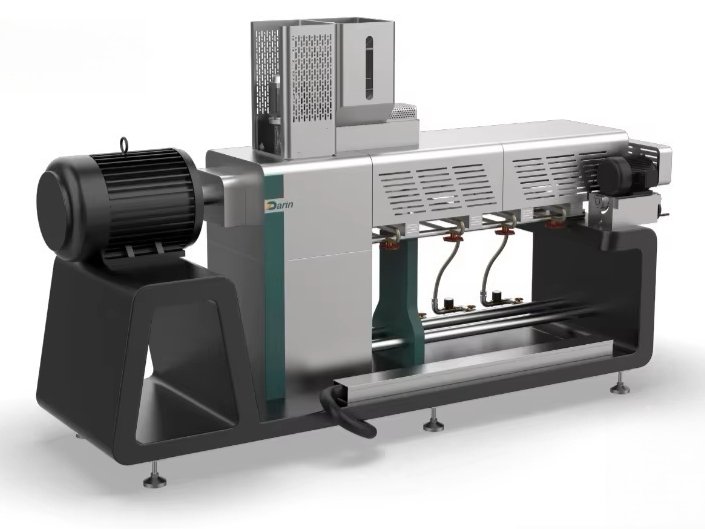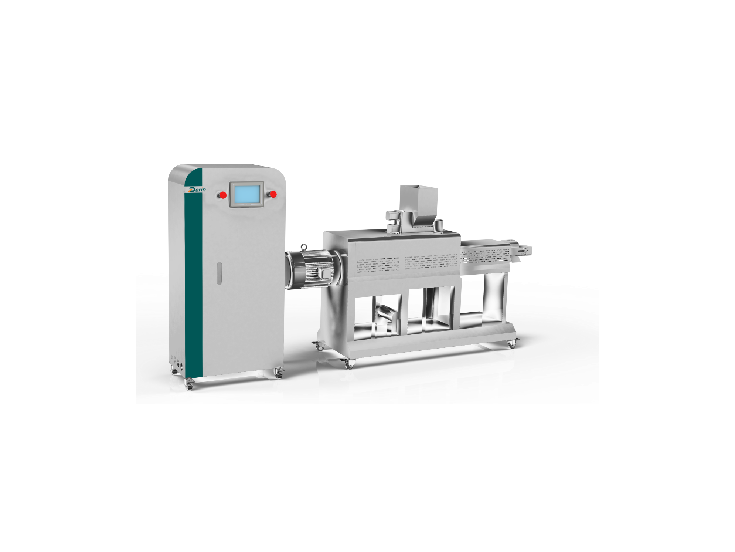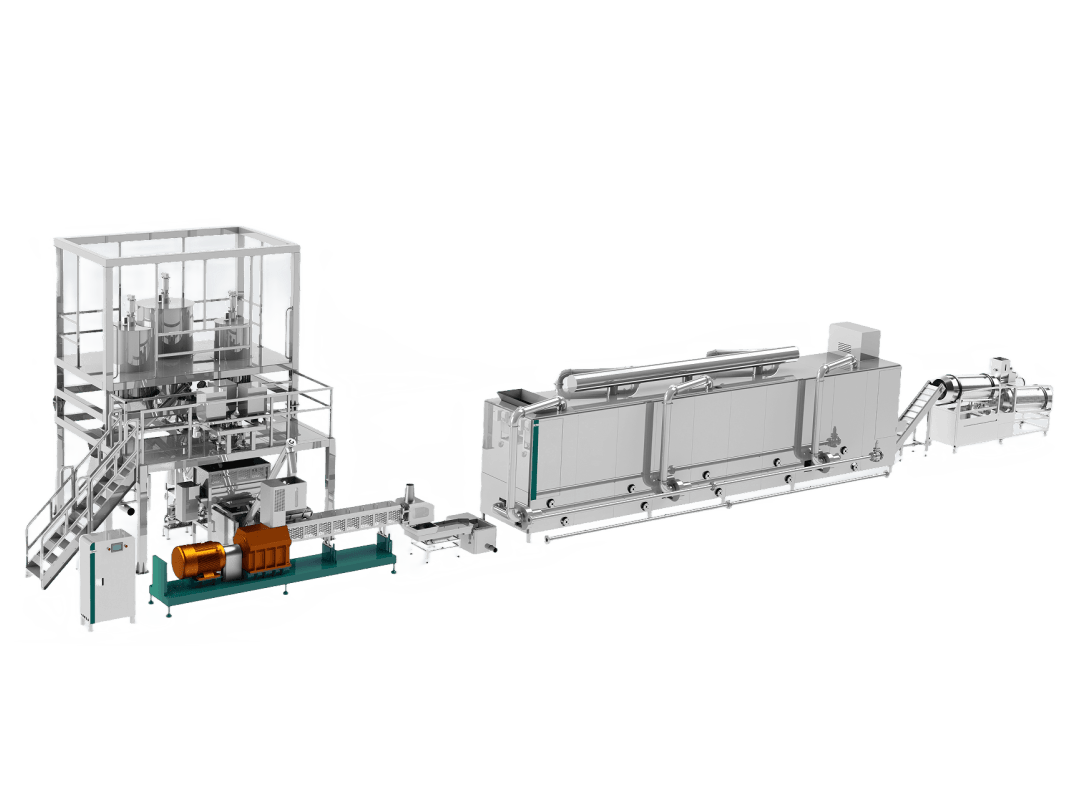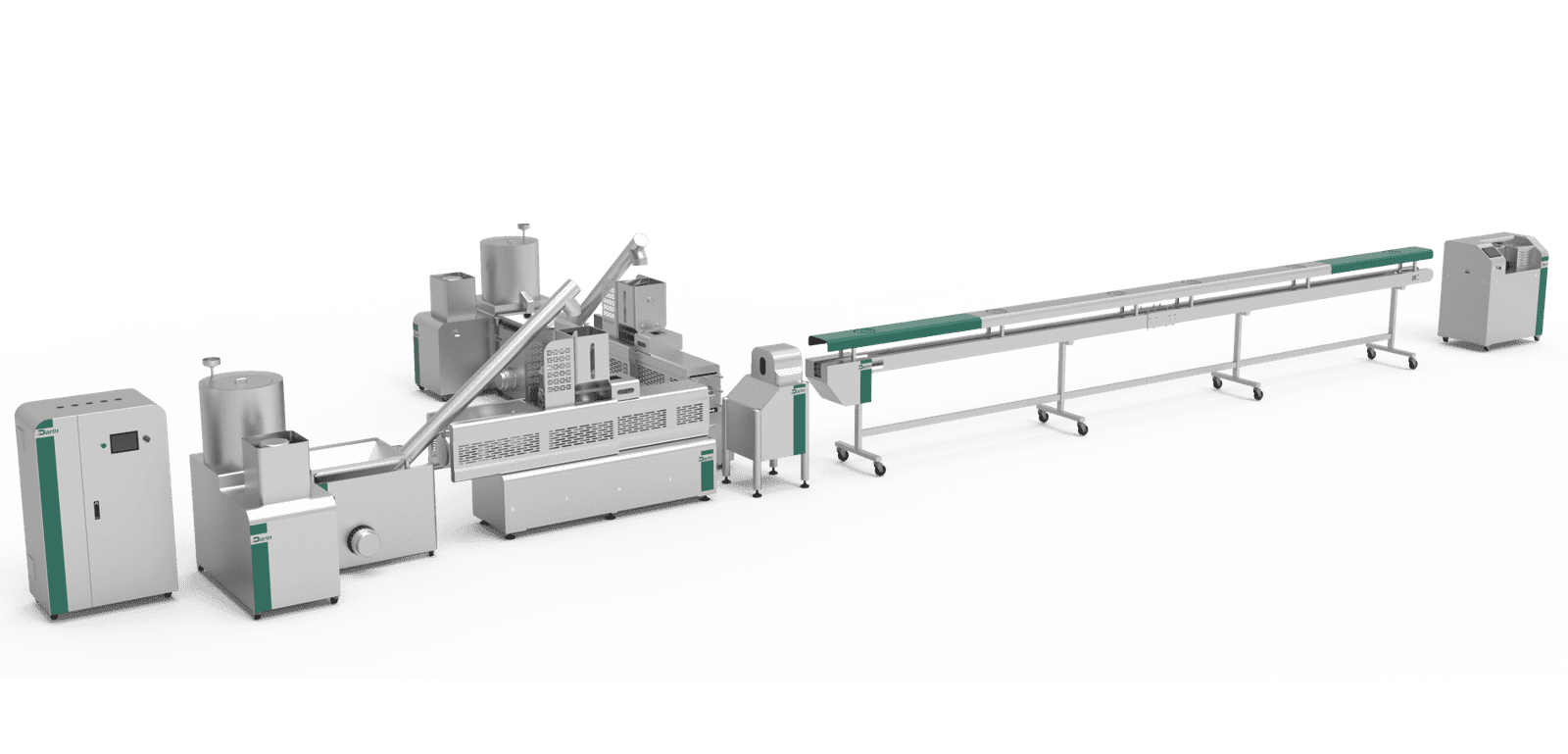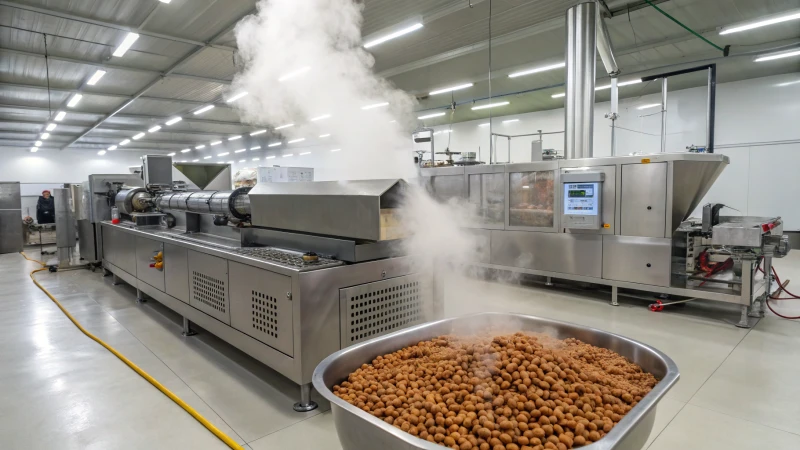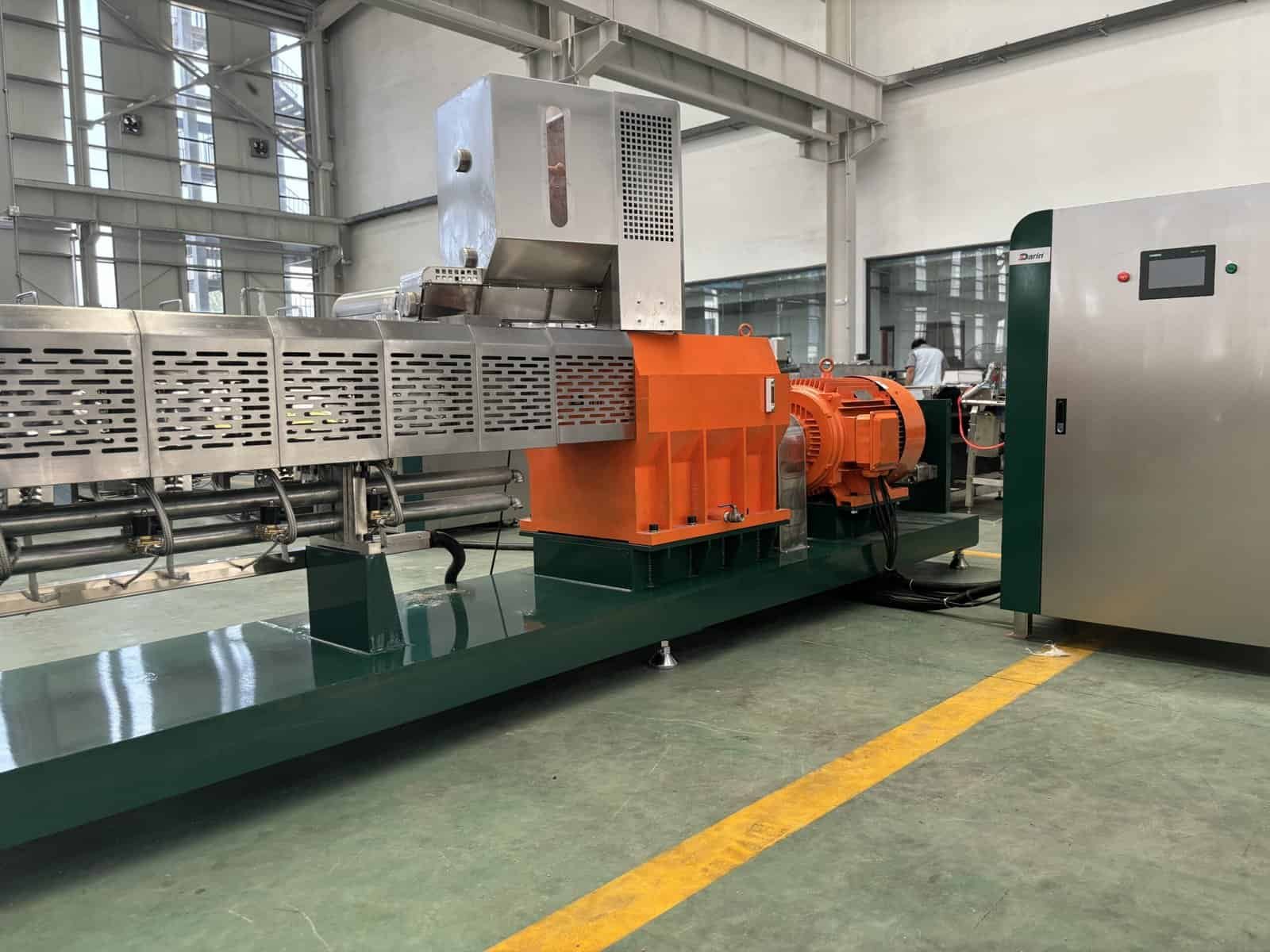
In modern food manufacturing, consistent texture, high efficiency, and precise ingredient control are essential. However, many conventional single-screw extruders struggle with sticky, high-moisture, or multi-phase formulations. This leads to poor mixing, irregular product quality, and high waste. That’s where twin-screw extruders solve the problem. With their intermeshing dual screws and modular design, they offer superior mixing, excellent control over temperature and shear, and versatile adaptability—making them indispensable in pet food, cereal, snack, and meat alternative production. This article explains exactly what twin-screw extruders are and why they’re transforming the food processing landscape.
A twin-screw extruder in food processing is a high-performance machine that uses two co-rotating or counter-rotating screws to continuously mix, cook, and shape food materials under controlled temperature, pressure, and shear conditions—offering superior versatility, throughput, and ingredient handling compared to single-screw extruders.
This guide will walk you through their structure, working principle, advantages, and practical applications in food production. Whether you're producing textured soy protein, puffed snacks, pet food, or cereal, understanding twin-screw extruders is essential to optimizing your output and quality.
\
Twin-screw extruders are only used for plastic and industrial materials.False
Modern twin-screw extruders are extensively used in food industries to produce snacks, cereals, pasta, meat analogs, and pet foods.
What Is a Twin-Screw Extruder?
A twin-screw extruder is a continuous processing system consisting of a barrel with two intermeshing screws rotating inside. In food applications, these screws are typically co-rotating (moving in the same direction), which enhances material transport and shear mixing. The screws convey food ingredients from the feeding zone to the cooking and shaping zones, where high temperature and pressure convert raw mix into finished products.
Unlike batch cooking methods, twin-screw extrusion is continuous and highly controllable. This allows for automation, scalability, and excellent repeatability, critical for maintaining consistent product quality.
Structure of a Twin-Screw Extruder
| Component | Description |
|---|---|
| Feeding Hopper | Where raw materials are introduced; can include multiple feeding ports. |
| Screw Elements | Configurable parts for conveying, mixing, and shearing materials. |
| Barrel Sections | Modular casing around screws with controlled heating and cooling. |
| Die Head | Final shaping section, forming the extruded product. |
| Control Panel | Digital interface for adjusting temperature, screw speed, and process logic. |
These parts work together to achieve the desired processing outcomes. Different screw profiles can be arranged along the barrel to fine-tune cooking, mixing, and shear according to the product being made.
Working Principle of a Twin-Screw Extruder
- Feeding: Ingredients (dry powders, liquids, steam, fats) are metered into the hopper and fed into the barrel.
- Conveying: Twin screws rotate and transport the material forward.
- Mixing & Shearing: As materials move through the screw elements, they are subjected to intense mixing and mechanical energy.
- Cooking: Controlled heat is applied via electric heaters or steam, cooking the mix under pressure.
- Shaping: The hot, cooked dough is pushed through a shaping die to form final product shapes (puffs, pellets, curls, sticks, etc.).
- Expansion & Cutting: Upon exiting the die, pressure drop causes instant expansion. A cutter then slices products into precise lengths.

Twin-Screw vs Single-Screw Extrusion
| Parameter | Twin-Screw Extruder | Single-Screw Extruder |
|---|---|---|
| Mixing Capability | Excellent (due to intermeshing screws) | Limited |
| Material Flexibility | Can process sticky, wet, and multiphase | Restricted to dry or uniform materials |
| Throughput Control | High precision and consistency | Less controllable |
| Startup Time | Shorter and more stable | Longer and more sensitive |
| Cost | Higher initial cost | Lower investment |
\
Twin-screw extruders are more energy-efficient than single-screw extruders for most food applications.True
Despite higher power draw, twin-screw extruders deliver greater output per unit energy, making them more energy-efficient per kilogram of product.
Applications of Twin-Screw Extruders in the Food Industry
Twin-screw extruders are widely used across multiple segments due to their flexibility in handling diverse raw materials and recipes.
Key Application Areas
| Industry Segment | Example Products |
|---|---|
| Snack Foods | Corn puffs, cheese balls, rice sticks, multigrain snacks |
| Breakfast Cereals | Flakes, rings, pillow-shaped cereals |
| Pet Foods | Dry kibble for cats and dogs, specialty veterinary diets |
| Plant-Based Proteins | Textured vegetable protein (TVP), meat analogs like nuggets and strips |
| Pasta | Short-cut pasta such as penne, fusilli, macaroni |
| Confectionery | Filled cereal bars, licorice, fruit leathers |
| Baby Foods | Nutritional rice-based puffs, fortified infant cereals |
Each of these applications uses custom die heads, moisture injection, and screw profiles tailored to the processing needs.
Advantages of Twin-Screw Extrusion in Food Processing
- Superior Mixing & Cooking Control: Accurate control over shear, temperature, and residence time.
- Modular Design: Screw and barrel elements can be adjusted for different recipes or products.
- Multi-Ingredient Handling: Capable of blending oils, liquids, powders, and steam into a homogenous mass.
- High Output Efficiency: Suitable for large-scale production with minimal waste.
- Quick Changeovers: Designed for rapid recipe switching and product diversity.
Real-World Data: Twin-Screw Extruder Efficiency
Below is a comparative chart of output efficiency (kg/hour) vs. energy consumption (kWh) for common applications:
| Product Type | Output Capacity (kg/h) | Energy Consumption (kWh) | Energy per kg (kWh/kg) |
|---|---|---|---|
| Pet Food Kibble | 1,200 | 180 | 0.15 |
| Soy Protein Strips | 600 | 110 | 0.18 |
| Snack Puffs | 1,000 | 160 | 0.16 |
| Breakfast Cereal | 800 | 135 | 0.17 |
\
Twin-screw extruders require constant cleaning and disassembly after every shift.False
Many modern extruders are designed for CIP (clean-in-place) or fast disassembly, enabling efficient sanitation without daily breakdowns.
Case Study: Twin-Screw Extrusion in High-Moisture Meat Alternatives
An American food startup wanted to develop a clean-label meat substitute using soy and wheat protein. Traditional batch mixers failed to achieve the desired fibrous texture. After adopting a twin-screw extruder with a cooling die module, they successfully produced a layered, meat-like structure with 60% moisture content. Product acceptance in taste tests improved by 78%, while waste was reduced by 35%.
Summary
Twin-screw extruders have revolutionized food processing by combining mechanical mixing, thermal processing, and shaping in one continuous step. Their flexibility, efficiency, and product consistency make them the ideal solution for modern food manufacturers aiming for innovation, productivity, and quality assurance.
Ready to Upgrade Your Food Production?
Darin Machinery is a professional manufacturer of twin-screw food extruders with CE and ISO certifications. Whether you're launching a new plant-based product or scaling up snack production, we provide tailored, end-to-end solutions. Contact us today to explore how our twin-screw extruders can boost your productivity.
FAQ
Frequently Asked Questions
What is a twin-screw extruder used for in food processing?
A twin-screw extruder is used to cook, mix, and shape food ingredients into products like snacks, cereals, and pet food. It offers precise control over heat, pressure, and shear, enabling consistent product quality and versatility in formulation.
What are the benefits of using a twin-screw extruder?
Twin-screw extruders offer superior mixing, higher output, better control over moisture and temperature, and the ability to process complex recipes. They are ideal for creating uniform, high-quality products and quick recipe changeovers.
What types of food can be made using twin-screw extrusion?
Twin-screw extrusion is used to produce puffed snacks, breakfast cereals, textured vegetable protein (TVP), plant-based meat, dry pet food, and fortified or functional foods.
How does a twin-screw extruder differ from a single-screw extruder?
Unlike single-screw extruders, twin-screw models have two intermeshing screws that provide better mixing, self-wiping action, and greater flexibility for handling a wide range of ingredients and moisture levels.
Can twin-screw extruders handle high-moisture formulations?
Yes, twin-screw extruders are ideal for high-moisture extrusion, such as meat analogs or soft pet treats, thanks to their adjustable shear and efficient material conveying systems.
6. References
- Clextral Twin-Screw Technology - https://www.clextral.com/en/extrusion-systems/twin-screw-extrusion/ - Clextral
- Principles of Food Extrusion - https://www.sciencedirect.com/science/article/pii/B978012814229100005X - ScienceDirect
- Extruders in Snack Food Manufacturing - https://www.foodmanufacture.co.uk/Article/2020/09/28/Why-extrusion-is-essential-for-snack-manufacture - Food Manufacture UK
- Extrusion Cooking - https://www.ift.org/news-and-publications/food-technology-magazine/issues/2015/august/features/extrusion-cooking - Institute of Food Technologists
- Twin-Screw Extrusion of High-Moisture Foods - https://www.researchgate.net/publication/331346376 - ResearchGate
- Twin-Screw vs Single-Screw - https://www.extrusion-link.com/twin-vs-single-screw-extruders/ - Extrusion Link
- Food Extrusion Overview - https://www.buhlergroup.com/content/buhlergroup/global/en/industries/food/extruded-products.html - Bühler Group
- Pet Food Manufacturing Technology - https://www.petfoodindustry.com/articles/10517-twin-screw-extruders-in-pet-food-manufacturing - Pet Food Industry
- Plant-Based Meat via Extrusion - https://www.gfi.org/resource/extrusion-guide/ - Good Food Institute
- Food Extrusion Equipment - https://www.bakerperkins.com/Food-Processing/Extrusion/ - Baker Perkins


